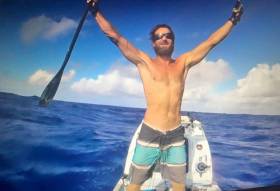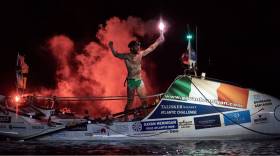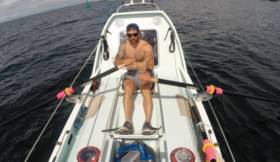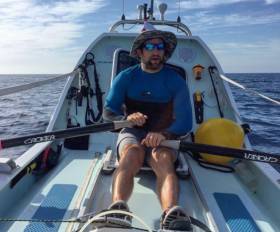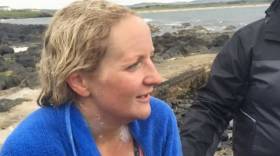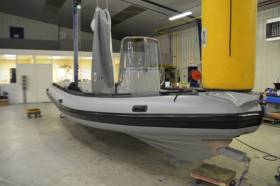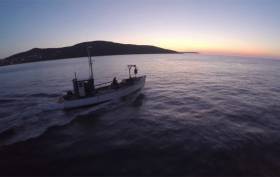Displaying items by tag: Atlantic
#SUP - South African adventurer Chris Bertish has become the first man to cross the Atlantic by stand-up paddleboard, as the Guardian reports.
The big wave surfer took 93 days to traverse the ocean from Agadir in Morocco to Antigua, where Ireland’s ocean rower Gavan Hennigan set his own transatlantic record in January.
That effort required Bertish, 42, to paddle some 43 miles a day on his custom 20ft expedition paddleboard designed by Phil Morrison, the naval architect also responsible for the latest National 18 design.
The Guardian has more on the story HERE.
Ocean Rower Gavan Hennigan is Afloat Rower of Month
#Rowing: The Afloat Rower of the month for January is Gavan Hennigan. The Galway man set a new Irish record for a solo row across the Atlantic ocean. He crossed from La Gomera in the Canary Islands to Antigua in the West Indies in 49 days 11 hours 37 minutes and 21 seconds, the fastest solo row for this course. He finished a remarkable third in the 12-boat Talisker Whisky Atlantic Challenge. He beat all the boats except two fours and won a stirring battle with the three-man crew of American Oarsmen.
Rower of the Month awards: The judging panel is made up of Liam Gorman, rowing correspondent of The Irish Times, and David O'Brien, editor of Afloat magazine. Monthly awards for achievements during the year will appear on afloat.ie. Keep a monthly eye on progress and watch our 2017 champions list grow.
Hennigan Fights Winds to Protect Third
#Rowing: He has new rivals for his placing, but Gavan Hennigan remains in the top three of the Talisker Whisky Atlantic Challenge. Facing It, a South African trio have taken over from American Oarsmen, also a trio, in fourth place. As the winds change, Hennigan’s progress has been a little slower than in recent days. However, as of midday on Wednesday, Facing It were over 60 nautical miles (over 110 km) behind the Irish solo rower on the row from the Canaries to Antigua. “Busy cementing third and working hard to stay there,” was Hennigan’s comment on his site, gavanhennigan.com.
Solo Rower Hennigan Showing the Way in Atlantic Race
#Rowing: A week into his Atlantic crossing, Gavan Hennigan continues to do exceptionally well. The Galway man is the fastest solo rower in the Talisker Whisky Atlantic Challenge from La Gomera to Antigua. More impressively, he is fourth overall of the 12 boats. Hennigan is farther into the race than a four, two trios and two pairs, as well as the other three solo rowers. At the head of the field, two fours are fighting it out: Latitude 35 from America and Row for James from Britain. Just ahead of Hennigan, whose team is called Soulo Gav, is the trio, American Oarsmen. Hennigan has been warned that there may be difficult weather ahead.
#SeaSwim - Charity worker Heather Clatworthy has become only the second swimmer to cross the Atlantic between the Inishowen Peninsula and Portstewart on the North Coast – and the first in nearly 90 years, according to the Irish Examiner.
The 34-year-old, who lives in Warwick with her family but grew up in Portstewart, crossed the expanse of open sea on Wednesday 27 July in around half the time expected, reaching the shore a little over four hours after setting out from Stroove beach in Moville.
“Two hours in I just didn’t think I was going to do it,” she said after powering through illness and choppy waters to complete her amazing feat, last achieved by famous English Channel swimmer Mercedes Gleitze in 1929.
The Belfast Telegraph has video of Clatworthy as she set out on her remarkable challenge:
In other sea swimming news, Galway long distance swimmer Alice Flood celebrated her swim across the English Channel earlier this week.
As the Galway Independent reports, the Bushy Park native made the gruelling crossing in just under 14 hours and joins an elite group of swimmers who've completed the England-to-France challenge.
#Solo - Pictured above is the RIB that French sailor Christophe Maupaté will pilot solo in his quest to set a new Atlantic record from Bordeaux to New York.
Previously attempted by Ireland's own Enda O'Coineen, no one has yet completed a solo transatlantic voyage by RIB.
But as reported on Afloat.ie last December, Figaro veteran Maupaté has been planning his own crossing for some time, having plotted a 4,460-nautical-mile course that will take him from France via Ireland's East Coast, western Scotland, the Faroe Islands and Iceland to the southern tip of Greenland and Canada's Maritimes towards the US – tracing the route of Lafayette's Hermione.
Now Maupaté's record attempt is just weeks away, launching from Bordeaux on Saturday 16 July with a stopover in Dun Laoghaire expected in the first few days.
'Atlantic' Director Talks Impact Of Economic & Ecological Change On Coastal Communities
#Documentary - "It’s about understanding the ocean, working with the ocean. Not just seeing it as something to grab, but as something you look after."
That's the message of new documentary Atlantic by Irish filmmaker Risteard Ó Domhnaill, who spoke to Ian Maleney for The Irish Times on its release in Irish cinemas yesterday (Friday 29 April).
As previously reported on Afloat.ie, the feature-length documentary – narrated by Emmy Award-winner Brendan Gleeson – follows the fortunes of three small Atlantic coastal fishing communities in Ireland, Canada and Norway.
Each facing their own challenges, from the impact of oil exploration and climate change to the pressures of large-scale commercial fishing.
And as Ó Domhnaill relates from his experience making the film, these livelihoods have changed dramatically even in only the last five years.
"Who knows what’s going to happen, what’s going to hit the ocean?" he says of the years ahead. "Acidification, warming of currents? We’re facing a crossroads. We can’t just fence off our part of the sea and say ‘We’ll look after that’. It’s a much bigger challenge."
The Irish Times has much more on the story HERE.
British Rowers Rescued In Atlantic Record Attempt
#Rowing - Four intrepid British women were rescued from the Mid Atlantic in the early hours of this morning (Sunday 14 February) after capsizing during a rowing record attempt for charity.
As the Guardian reports, Gemma Chalk, Clare Lanyon, Jane McIntosh and Olivia Wilson were aiming to break the women's rowing speed record from the Canary Islands to Barbados when they lost their oars and GPS system after a series of capsizes some 400 nautical miles off Cape Verde.
But the women were able to get in contact with the UK Coastguard by satellite phone and activate an emergency beacon to direct passing vessels to their location – and they were finally picked up by a Canada-bound bulk carrier that diverted course to go to their aid.
“This shows you how important it is to be prepared for your voyage and have several means of contacting the coastguard or raising an alarm, even if you are not in UK waters," said UK Coastguard duty controller Ian Guy.
The Guardian has more on the story HERE.
French Solo Sailor Aims For Atlantic RIB Record
#Solo - French sailor Christophe Maupaté aims to follow in the wake of Ireland's own Enda O'Coineen in his attempt to be the first person to cross the Atlantic solo from Bordeaux to New York by RIB.
The Figaro veteran will set off on 16 July 2016 from Bordeaux heading north, via the Celtic and Irish Seas – including a stop-over in Dun Laoghaire – on an epic voyage that will see him trace a semi-circle around the North Atlantic.
That route takes Maupaté via the Orkneys, Iceland and the southern tip of Greenland to Canada's Maritimes provinces and onward to New York to coincide with a commemorative voyage by a replica of historic French general Lafayette's ship Hermione.
And he'll be doing it all single-handedly in a 7.5m RIB, a custom French-built Zeppelin, equipped with a Suzuki four-stroke outboard motor and Garmin navigation and communication devices.
The Atlantic has been crossed by RIB several times before, most notably by TV adventurer Bear Grylls and team in 2003 from Canada to Scotland, and more recently by the Brown brothers from Florida to London in 2009.
But the closest anyone's come to a solo RIB crossing was Enda O'Coineen, when he helmed the 5.5m Zodiac RIB Kilcullen III from Halifax in Nova Scotia to Dunmore East in the mid 1980s – a voyage recounted in his book The Unsinkable Kilcullen.
There is no Guinness World Record for O'Coineen's feat, so Maupaté aims to be the first into the books with his own incredible expedition of some 4,460 nautical miles.
More details can be found on the official Bordeaux -> New York in Solitare website HERE.
We Can't Breathe Without The Sea
The dominant subject in the past week has been the weather – pictures on television and in the newspapers of water pouring through streets, into houses, shops, stranded cars and so on – bringing in its wake flooding, destruction, tragedy in its effects on people’s lives. I have heard from seafarers who faced appalling conditions at sea - winds gusting from 50 miles an hour, up to 100, accompanied by massive seas, huge waves. Nightly on television the weather maps have shown where it was all coming from – across the oceans – spinning over the Atlantic, moving in the jet stream, lashing the first land mass it encountered, THIS ISLAND NATION…..
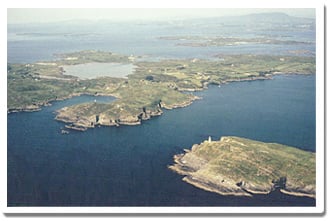 Sherkin Island in West Cork
Sherkin Island in West Cork
Nature does show us humans at times just how little we can control her moods and what can be unleashed upon us and I wonder if people fully realise the importance of the oceans.
Matt Murphy lives on one of our offshore islands which felt the first lash of the gales in the past week. That’s Sherkin Island off Baltimore in West Cork where he founded and has run the Sherkin Marine Station for 40 years and was an early exponent of the need to be aware of climate change:
Matt outlined his views to me in an interview which you can hear on the audio Podcast of THIS ISLAND NATION above.
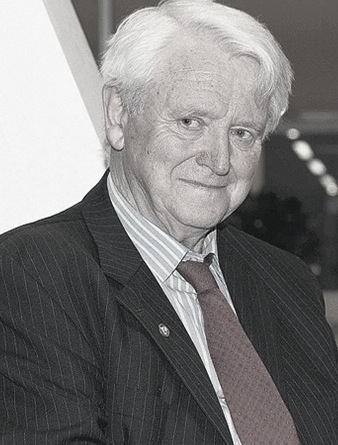 Matt Murphy
Matt Murphy
I attended a seminar in Dublin a fortnight ago as part of the Sea for Society programme, which is an extensive European Commission project, promoting the opportunities in the seas, but also warning about the threats to them from human behaviour. The seas, the oceans are a marvellous place, so vital to our human welfare, but at the seminar I wondered if those of us who are aware of the maritime importance in life are talking to ourselves and that the message may not be getting through to the public at large. Have you ever listened, really listened, to the sounds of the ocean?
It is worth listening to these unusual sounds, which you can hear on the Podcast. For example, have you ever heard the sound a haddock makes?
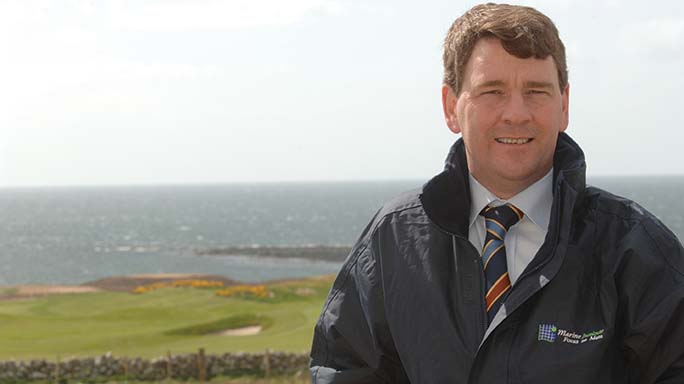 Dr. Peter Heffernan
Dr. Peter Heffernan
Those sounds should, surely, make one think about life in the oceans and men like Dr.Peter Heffernan do. He is Chief Executive of the Marine Institute which carried out a seabed survey between Newfoundland and Ireland in the past year.
He summarised for me the importance of the oceans:
You can hear Peter Heffernan outline in the Podcast why “every time we breathe… we need the sea….”
Indeed we do …. Let’s remember that…….



























